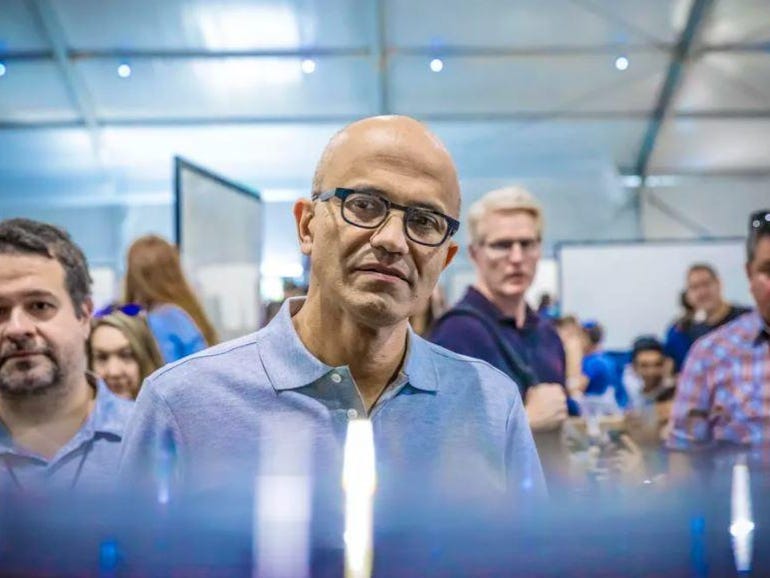Nadella's acquisitions: How Nuance stacks up

Credit: CNET
Microsoft has bought nearly 80 companies since Satya Nadella took over as CEO in early 2014. And it’s rumored to have tried and to be trying to acquire even more (hello TikTok, Pinterest, Discord, etc.). On April 12, Microsoft made its second largest acquisition in corporate history by buying Nuance Communications, a conversational AI vendor, for $19.7 billion. Beyond size, how does this purchase stack up against other Nadella acquisitions?
It seems easy to make a case that Nuance is an almost natural fit for Microsoft. Nuance’s history is anchored in voice technology, but this acquisition isn’t about trying to make Cortana a Siri or Alexa voice assistant contender (again). Microsoft and Nuance have been partners for the past few years and worked together on Nuance’s latest marquee product, called Dragon Ambient Experience (DAX). Both companies are cloud-first and enterprise first. Nuance still sells some “boxed” software, like Microsoft does, but it’s trying to migrate its customers to services as fast as it practically can.
With LinkedIn and GitHub, Microsoft officials emphasized that they planned to let both of those acquisitions largely operate as independent entities even after Microsoft took them over. Similarly, Microsoft has downplayed its role as owner of its Metaswitch and Affirmed Networks acquisitions by almost hiding its parental status on their web sites, blog posts and press releases, referring to each in small print as “A Microsoft Company.”
But there were no mentions of any kind of self-governance plans at all in Microsoft’s press release about the Nuance acquisition or on the call Microsoft held with analysts today to explain the deal. Maybe that’s because Nuance’s cloud-first services dovetail nicely and understandably with Microsoft’s own Azure, Azure AI, Dynamics 365 and Microsoft 365 services? And integration of Nuance and Microsoft services and workforces are essential to boosting Microsoft’s cloud and AI businesses? Or maybe 20-plus-year-old East Coast companies don’t need those kinds of concessions (says this no-nonsense East Coaster).
When Microsoft made its biggest acquisition ever — LinkedIn for $26.2 billion in 2016 — I remember more than a few analysts scratching their heads trying to understand the deal. (On the LinkedIn call, Microsoft took lots of analyst questions; on the Nuance call, there was not a question and answer component — maybe because none was really needed.) In making the case for the LinkedIn deal, Microsoft officials repeated that LinkedIn’s data graph and Microsoft’s data graph would be integrated. To date, there’s been relatively little of that between the two companies and LinkedIn largely continues to run as a separate enterprise social network.
Nuance has honed its focus in the past months so that two-thirds of its business comes from healthcare and the remaining third from the enterprise. Its DAX service records doctor-patient conversations; turns the recording into context-aware notes; and incorporates those notes in a way that preserves security, compliance and privacy, into medical workflows that can be augmented by partners. In short, Nuance is all about productivity services. Sounds like … Microsoft.
And even though Microsoft is really playing up the growth potential in the lucrative healthcare vertical with the Nuance purchase, DAX can be applied beyond healthcare, as Microsoft Executive Vice President of Cloud + AI Scott Guthrie told analysts on the Nuance call. “Nearly any professional service could benefit” from the record-transcribe-contextualize productivity loop that DAX provides.
Since Nadella became CEO, Microsoft has made many, relatively smaller, targeted acquisitions meant to bolster its AI, cloud, developer and security offerings. Microsoft has made a few bigger acquisitions since he became CEO, such as Mojang/Minecraft; Xamarin; and recently, ZeniMax Media/Bethesda. Under Nadella to date, there really haven’t been any major Microsoft acquisitions that seemed truly out-of-character (other than LinkedIn and initially, Mojang, some might argue). I can see how Microsoft could build a strong case around a Discord acquisition, given how rooted Discord is in gaming. But if Microsoft ends up buying another consumer/creator “community” along the lines of Pinterest or TikTok, Nadella’s record for primarily practical — rather than aspirational — acquisitions may not be as pristine.
Microsoft has a lot of cash and seems ready to spend it. I’m curious if it will continue along the small and sensible enterprise acquisition route or try a Hail-Mary consumer play outside of its gaming vertical….

